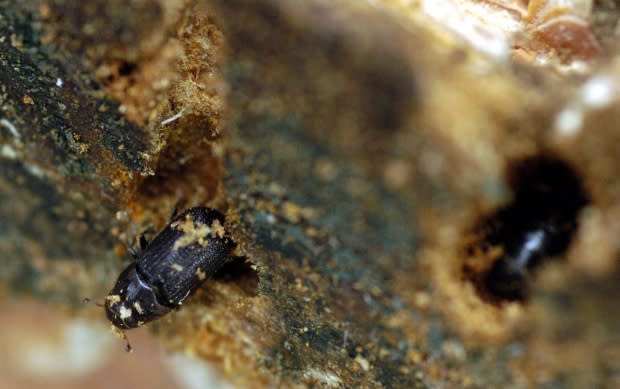Mountain pine beetle isn't in Saskatchewan yet, but could be on its way: report
A newly released report from Saskatchewan's Ministry of Environment warns of the possible spread of the devastating mountain pine beetle into northwestern Saskatchewan.
British Columbia saw a pine beetle outbreak which began in the mid-1990s and destroyed millions of hectares of forest. The beetle then spread into central and eastern Alberta, and there is now concern that the beetle could spread to the boreal forests of Saskatchewan.
The province's latest State of the Environment report warns that recent policy changes in Alberta may contribute to the eastward spread of the beetle.
"Alberta announced in 2018-19 that protecting key watersheds along the eastern stages of the Rockies and protecting endangered species would take priority over slowing the eastern spread of [the mountain pine beetle]," the report says.
"This could allow spot infestations along the eastern edge of Alberta to establish and spread, leaving boreal jack pine forests in Saskatchewan and the rest of Canada vulnerable to invasion by MPB. Large populations of MPB that have been building in western Alberta (Jasper and Hinton) may spread east," according to the report.
"That would mean mountain pine beetle could easily spread into east-central Alberta and Saskatchewan's northwest boreal forest."

The mountain pine beetle attacks and kills live trees by laying its eggs under the bark. The beetle prefers lodgepole pines, although it poses a threat to all pine species.
The government of Saskatchewan is now looking to survey and prevent any infestations in the province's boreal forest ecosystems by making the public aware of the beetle's presence.
The mountain pine beetle outbreak in British Columbia was a significant blow to the province's softwood lumber industry. According to the Saskatchewan report, the beetle infested over 18 million hectares during B.C.'s outbreak, and killed 54 per cent of the province's merchantable lodgepole pine.
As of now, there is no indication that the beetle is in Saskatchewan. But its arrival could have similar impacts here, the province's report says.
If an outbreak were to occur, it would have negative effects on the forestry industry — the second largest in Saskatchewan's north, the report says.
Because large portions of Saskatchewan's provincial parks are made up of pine forests, it could also have impacts on tourism and public safety, with an increased risk of forest fires because of dead trees.
To fight the spread of the beetle into the province, Saskatchewan is now conducting surveillance in the boreal northwest and in Cypress Hills Interprovincial Park, the report says.

The province says it has launched an active management plan through aerial and ground surveys, as well as setting up 57 bait stations in northwestern Saskatchewan and conducting ground-based monitoring.
The provincial government is urging people to be aware and report any beetles they may find to help prevent the further eastward spread of the insect.
The most effective method of control is to find beetle-infested trees in the fall and winter months, and then cut them down and burn them before the beetles spread out in the spring, the report says.

